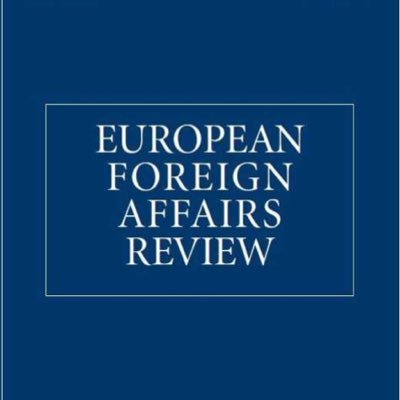
European Foreign Affairs Review
@EFAReview
Followers
426
Following
14
Media
106
Statuses
168
Editors: @RamsesWessel and @StevenBlockmans 📥 manuscripts to Dr. Said Hammamoun at [email protected]
@Scopus
Joined February 2020
The hatred and violence pushed through the algorithms of X are contrary to the values and principles shared by the members of the editorial board. We have migrated to 🦋 BlueSky and will de-activate this account. Please follow us on @efareview.bsky.social
1
1
1
The hatred and violence pushed through the algorithms of X are contrary to the values and principles shared by the members of the editorial board. We have migrated to 🦋 BlueSky and will de-activate this account. Please follow us on @efareview.bsky.social
1
1
1
Vol. 29/4: Analysing biofuels, hydropower, wind, nuclear and solar, Sarah Bufano explores whether there are new opportunities for EU-Brazil cooperation in renewable energy to meet the Strategic Partnership’s objectives. 👉 https://t.co/zmIvBbotPp
0
0
0
Natasha Georgio uses the new dynamics of EU-Russia energy relations, following the invasion of Ukraine, to engage in a theoretical debate about the conceptualizations of the EU as a liberal actor versus the perception of the EU as a realist actor. 👉 https://t.co/2VcwIDLs4y
0
0
3
Prof. Elaine @faheye examines the EU-US Trade and Technology Council’s overtly legalistic framing yet heavily delegalized outcomes using soft law to raise questions about the place of global law-making goals in the complex transatlantic relationship 👉 https://t.co/v1o940NUTZ
0
0
1
Tessa Sophie Hoffmann examines the complications of the new EU Foreign Subsidies Regulation’s interaction with state aid law & WTO subsidy law. She evaluates the German Monopoly Commission’s proposal to identify potential solutions for these challenges 👉 https://t.co/2I25uRsNyU
0
3
2
Dr @viktorszep @univgroningen shows that, since the ‘geopolitical Commission’, the traditional legal boundaries of the CFSP and the CCP have been blurred to the extent that it no longer makes sense to draw a strict line between these external policies. 👉 https://t.co/2tBI2zU4lJ
0
0
1
The pre-publication of Issue 4 is out online, prefaced by Zagreb University Professor Iris Goldner’s editorial. 👉 https://t.co/SGIOnOQqYL
0
0
2
Vol 29/SI: @Mariusz_Antonow argues, inter alia, that the @EU_Commission, together with Lithuania’s main allies, imposed an interpretation of EU sanctions against Russia that left the 🇱🇹-🇷🇺 border more open than Vilnius had wished for: https://t.co/SsqC5xNaxp
0
0
1
Social (dis)trust. In Vol 29/SI Katarzyna @Stokłosa3 examines how post-WW2 slowly acquired cross-border contacts & co-operation across the EU’s longest border 🇫🇮 with Russia were quickly lost after the full-scale invasion of Ukraine 👉 https://t.co/nux4bOo9Gs
0
0
1
The Russian-speaking & economically challenged region of Latgale🇱🇻 is often seen as a flashpoint for 🇷🇺 destabilisation. @Maris_Andzans studies Latgale’s transformation since 2022 from an almost ordinary borderland to a frontline region: https://t.co/e6qL3BAgVZ 📸 ©A. Rampazzo
0
2
5
Vol 29/SI: Prof Andrey Makarychev & @GlebYarovoy find that the vernacular geopolitics of Russian speakers living in Narva 🇪🇪 & 🇫🇮 is changing from subaltern to oppositional geopolitics in order to acquire political agency in the borderlands they inhabit 👉 https://t.co/M55DRUKSfB
0
1
4
As part of the Special Issue about the impact of the war in Ukraine on Europe-Russia borderlands, Dr. @BKartveit guides the reader through the 🇳🇴Norwegian town of Kirkenes to re-imagine cross-border relations in the high North 👉 https://t.co/XdWLtnjW3q
0
1
3
Vol 29/SI explores the implications of Russia’s war on 🇺🇦 on the borderlands from 🇳🇴to🇱🇹: transformation into a zone of confrontation, impacting cross-border interactions, regional security & normative frameworks. Eds: Profs Makarychev, Stoklosa & Yarovoy: https://t.co/SvQhX1cfpA
0
0
3
Issue 3: Do third states have access to the ECJ in order to seek annulment of an EU legal act that potentially violates their international agreement with the EU? @BrackeMatthias analyses the Venezuela v. Council judgment 👉 https://t.co/BjRunLkBg9
0
1
3
Issue 3: Towards a ‘Eurodeterrent’? @W_Verstraete argues that as the world is entering an era of nuclear disorder, Europeans should start a strategic dialogue on the necessity of nuclear weapons without undermining transatlantic relations 👉 https://t.co/PcA8NT8Zks
0
3
4
Issue 3: Laura Govaert @ugent analyses the European Commission’s trade and sustainable development (TSD) discourse over the past 20 yrs and concludes that it enabled neocolonial practices to become deeper and more prevalent 👉 https://t.co/4PLUPTl2Sc
0
0
2
Issue 3: Prof Fulvio Attinà & Associate Prof Marcello Carammia @unict_it assess the views of EU foreign policymakers on rules-based order, multipolarity & multilateralism to understand the EU’s position in the current transition phase of global order 👉 https://t.co/fEnNw7qqLM
0
2
3
New in Issue 3: @magnuslundniels analyses 12 State of the Union Addresses (2011-2023) and reveals a major shift in the EU’s self-narratives from ambition to consolidation 👉 https://t.co/CDYLuZ9hgp
0
1
6